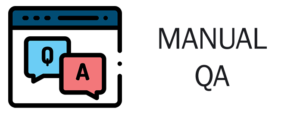Who Manual QA Engineer is
 A Manual QA (Quality Assurance) Engineer, also known as a Software Tester or QA Analyst, is a professional responsible for ensuring the quality and functionality of software applications and systems. Unlike automated testing, manual QA involves human intervention in executing test cases and verifying the software’s behavior against specified requirements.
Manual QA Engineers play a crucial role in ensuring the reliability, functionality, and user-friendliness of software applications before they are released to end-users. They provide valuable feedback to the development team, helping to improve the quality of the software and ensure a positive user experience. Manual testing is particularly useful for smaller projects or for scenarios where automated testing is not feasible or cost-effective. However, it may require more effort and time compared to automated testing for larger and more complex projects.
A Manual QA (Quality Assurance) Engineer, also known as a Software Tester or QA Analyst, is a professional responsible for ensuring the quality and functionality of software applications and systems. Unlike automated testing, manual QA involves human intervention in executing test cases and verifying the software’s behavior against specified requirements.
Manual QA Engineers play a crucial role in ensuring the reliability, functionality, and user-friendliness of software applications before they are released to end-users. They provide valuable feedback to the development team, helping to improve the quality of the software and ensure a positive user experience. Manual testing is particularly useful for smaller projects or for scenarios where automated testing is not feasible or cost-effective. However, it may require more effort and time compared to automated testing for larger and more complex projects. In which areas is Manual QA engineer most beneficial?
While automated testing is efficient for repetitive and extensive testing, Manual QA has its advantages, particularly when human intuition and expertise are required. Manual QA Engineers contribute significantly to ensuring the quality, functionality, and usability of software applications, supporting the development team in delivering a reliable and user-friendly product.
Manual QA Engineers are most beneficial in the following areas:
- Software Testing: Manual QA Engineers excel in performing thorough software testing, identifying bugs, defects, and issues that might not be easily detectable through automated testing.
- User Experience (UX) Testing: Manual QA Engineers play a crucial role in evaluating the user experience of software applications, ensuring that they are intuitive, user-friendly, and meet user expectations.
- Usability Testing: Manual QA Engineers conduct usability testing to assess how easily users can interact with the software and navigate through different functionalities.
- User Acceptance Testing (UAT): Manual QA Engineers collaborate with end-users to conduct UAT, ensuring that the software meets the users’ requirements and is ready for deployment.
- Exploratory Testing: Manual QA Engineers perform exploratory testing to identify unexpected defects and issues, mimicking real-world user scenarios.
- Ad-hoc Testing: Manual QA Engineers are skilled in performing ad-hoc testing, testing the software on-the-fly without predefined test cases.
- Small-Scale Projects: Manual QA is beneficial for smaller projects with limited resources, where setting up automated testing may not be practical.
- Quick Feedback: Manual QA provides quick feedback during development, allowing developers to address issues promptly.
- Compatibility Testing: Manual QA Engineers verify software compatibility across various devices, browsers, and operating systems.
- Complex Scenarios: Manual QA is valuable in testing complex scenarios where writing automated scripts might be time-consuming or not feasible.
- Early Stage Testing: Manual QA can be employed during the early stages of development when changes are frequent, and test cases need frequent modifications.
- Non-Functional Testing: Manual QA Engineers perform non-functional testing, such as performance testing, security testing, and stress testing.
